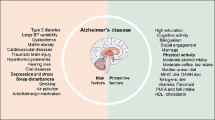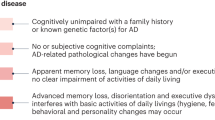Abstract
This paper focuses on the causation of diseases, particularly on the idea of a “genetic cause” taking Alzheimer’s Disease (AD) as an example. We (1) provide some historical information and a synopsis of the current knowledge on the etiology and pathogenesis of AD, (2) analyse some conceptual problems related to the notion of “genetic disease” (3) elaborate on the alleged (genetic) cause of AD, and (4) place the discussion on the cause of AD in a broader philosophical context, paying attention to a constructivist perspective, the notions of causal connection and causal selection, and to some practical and normative consequences of our analysis. We conclude (a) that AD is not a specific disease entity with one specific cause, (b) that the idea of a single (sufficient) cause can still function as a heuristic tool in AD research and practice, and (c) that a “belief” in causation can go together with the notions of multicausality and probability.
Similar content being viewed by others
References
Adelman R.C. (1995). The Alzheimerization of Aging. The Gerontologist 35:526–532
Adelman R.C. (1998). The Alzheimerization of Aging: a brief update. Experimental Gerontology 33(1/2):155–157
Alafuzoff, I. and H. Soininen: 2002, Neuropathology and Ethiopathogenesis of Alzheimer’s Disease, in: N. Qizlibash, et al. (eds.), Evidence-based Dementia Practice. Blackwell Publishing, pp. 244–259
Alzheimer A. (1906). Über einen eigenartigen schweren Erkrankungsprozess der Hirnrinde. Neurologisches Centralblatt 23:1129–1136
Badcott, D.: 2006, The causal fallacy of pharmacogenomics. This issue
Berchtold N.C., Cotman C.W. (1998). Evolution in the conceptualization of dementia and Alzheimer’s Disease: Greco-Roman period tot the 1960s. Neurobiology of Aging 19(3):173–189
Bertram, L. and R.E. Tanzi: 2004, Alzheimer’s disease: one disorder, too many genes?, Human Molecular Genetics 13, Review Issue 1, R135–R141
Brumback R.A. (2004). Neuropathology and symptomatology in Alzheimer Disease. In: Ruth B. Purtilo, Henk A.M.J. ten Have (eds), Ethical Foundations of Palliative Care for Alzheimer Disease. The Johns Hopkins University Press, Baltimore & London, pp. 24–46
Davis D.H.J. (2003). Dementia: sociological and philosophical constructions. Social Science & Medicine 58:369–378
Dillmann, R.J.: 1990. Alzheimer’s Disease. The Concept of Disease and the Construction of Medical Knowledge. Amsterdam: Thesis Publishers
Gelehrter Th.D., Collins F.S. (1990). Principles of Medical Genetics.Williams & Wilkins, Baltimore
Glasersfeld E. von (1987). The Construction of Knowledge: Contributions to Conceptual Semantics. Intersystems Publications, California
Have, H. ten, Purtilo R. (2004). Historical overview of a current global challenge. In: Ruth B. Purtilo, Henk A.M.J. ten Have (eds), Ethical Foundations of Palliative Care for Alzheimer Disease. The Johns Hopkins University Press, Baltimore & London, pp. 1–4
Hesslow G. (1984). What is a genetic disease? On the relative importance of causes. In: Nordenfelt L., Lindahl B.I.B. (eds), Health, Disease and Causal Explanations in Medicine. Reidel, Dordrecht, pp. 183–193
Hoedemaekers R.H.M.V. (1998). Normative determinants of genetic screening and testing. Eburon, Delft
Hoedemaekers R.H.V.M. (2001). Geniticization. In: Chadwick R. (ed), The Concise Encyclopedia of the Ethics of New Technologies. Academic Press, San Diego, California, pp. 157–164
Holstein M.B. (1998). Ethics and Alzheimer’s Disease: widening the lens. The Journal of Clinical Ethics 9(1):13–22
Jonker C. (2002). Dementie: ziekte of veroudering. Inaugurele rede. Amsterdam, VU
Karhausen L.R. (1996). The logic of causation in epidemiology. Scandinavian Journal of Social Medicine 24(1):8–13
Khachaturian, Z.S.: 2002, ‘Foreword’ in: N. Qizlibash, et al. (eds), Evidence-based Dementia Practice. Blackwell Publishing
Lee, H.-G., G. Casadesus, X. Zhu, A. Takeda, G. Perry and M.A. Smith: 2004, ‘Challenging the Amyloid Cascade Hypothesis. Senile Plaques and Amyloid-β as Protective Adaptations to Alzheimer Disease’ Annals New York Academy of Sciences 1019, 1–4.
Lippman A. (1991). Prenatal genetic testing and screening: constructing needs and reinforcing inequities. American Journal of Law and Medicine 17,15–50
Mackie J.L. (1985). Logic and Knowledge. Selected Papers Vol. I. Oxford University Press, Oxford
Maurer K., Volk S., Gerbaldo H. (1997). Auguste D and Alzheimer’s disease. The Lancet 349:1546–1549
Neumann-Held E.M. (2001). Can it be a “sin” to understand disease? On “genes” and “eugenics” and an “unconnected connection” Medicine, Health Care and Philosophy 4:5–17
Nordenfelt, L.: 1981, Causation. An Essay. Stockholm: Förlaget Akademilitteratur
Olde Rikkert M.G.M., A-S Rigaud, van Hoeyweghen R.J., de Graaf J (2003). Geriatric syndromes: medical misnomer or progress in geriatrics?. The Netherlands Journal of Medicine 61(3):26–30
Olde Rikkert M.G.M., Teunisse J.-P., Vernooij-Dassen M. (2005). One hundred years of Alzheimer’s disease and the neglected second lesson of Aloïs Alzheimer on multicausality in dementia. American Journal of Alzheimer’s Disease and Other Dementias 20(5):269–272
Olde Rikkert M.G.M, van der Flier W.M., De Leeuw F.E., Verbeek M., Jansen R.W., Verhey F., Scheltens Ph. (2006). Multiple diagnostic tests are needed to assess multiple causes of dementia. Archives of Neurology 63(1):144–146
Poirier J., Danik M., Blass J.P. (1999). Pathophysiology of the Alzheimer Syndrome. In: Gauthier S. (eds), Clinical Diagnosis and Management of Alzheimer’s Disease. Martin Dunitz, London, pp. 17–32
Rizzi D.A. (1994). Causal reasoning and the diagnostic process. Theoretical Medicine 15:315–333
Rizzi D.A., Andur Pedersen St. (1992). Causality in medicine: towards a theory and terminology. Theoretical Medicine 13:233–254
Roher A.E., Kuo Y.M., Kokjohn K.M., Emmerling M.MR., Gracon S. (1999). Amyloid and lipids in the pathology of Alzheimer disease. Amyloid 6(2):136–145
Roks C.M.A.A. (2001). Alzheimer’s Disease. A Genetic Epidemiologic Approach. EUR, Rotterdam
Roses A.D., Pericak-Vance M.A. (2002). Alzheimer disease and other dementias. In: Rimoin D.L. et al. (eds), Emery and Rimoin’s Principles and Practice of Medical Genetics. Churchill Livingstone, London, pp. 2894–2916
Royall D. (2003). The “Alzheimerization” of dementia research. Journal of the American Geriatric Society 51:277–278
Sluiter H.J. et al. (1991). The Dutch Hypothesis (chronic non-specific lung disease) revisited. European Respiratory Journal 4:479–489
Smith K. (2001). A disease by any other name: musings on the concept of a genetic disease. Medicine, Health Care and Philosophy 4:19–30
Sober E. (2000). The Meaning of Genetic Causation. In: Buchanan A. et al. (eds), From Chance to Choice. Genetics and Justice. Cambridge Universiy Press, Cambridge, pp. 347–370
George-Hyslop St. P.H. (2000). Genetic Factors in the Genesis of Alzheimer’s Disease. In: Khachaturian Z.S., Mesulam M.M. (eds), Alzheimer’s Disease. A Compendium of Current Theories. New York Academy of Sciences, New York, pp. 1–7
Stempsey W.E. (1999). Disease and Diagnosis. Value-dependent Realism. Kluwer Academic Publishers, Dordrecht
Tanzi R.E., Bertram L. (2005). Twenty years of the Alzheimer’s Disease Amyloid Hypothesis: a genetic perspective. Cell 120:545–555
Temple L.K.F., McLeod R.S., Gallinger S., Wright J.G. (2001). Defining disease in the genomics era. Science 293:807–809
Torre J. de la (2004). Is Alzheimer’s disease a neurodegenerative disorder or a vascular disorder? Data, dogma, and dialectics. The Lancet Neurology 3:184–190
Tuszynski M.H.,U H.S., Alksne J., Bakay R.A., Pay M.M., Merrill D., Thal L.J. (2002). Growth factor gene therapy for Alzheimer disease. Neurosurgical Focus 13(5):e5
Verlinsky Y. et al. (2002). Preimplantation diagnosis for early-onset alzheimer disease caused by V717L mutation. Journal of the American Medical Association 287:1018–1021
Vermeire P.A., Pride N.B. (1991). A “splitting” look at chronic non-specific lung disease (CNSLD): common features but diverse pathogenesis. European Respiratory Journal 4:490–496
Wagner A. (1999).‘Causality in complex systems. Biology and Philosophy 14:83–101
Wulff H.R. (1984). Comments on Hesslow’s what is genetic disease? In: Nordenfelt L., Lindahl B.I.B. (eds), Health, Disease and Causal Explanations in Medicine. Reidel, Dordrecht, pp. 195–197
Wulff H.R. (2001). ‘A return to biological thinking in medicine. Medicine, Health Care and Philosophy 4:1–3
Author information
Authors and Affiliations
Corresponding author
Rights and permissions
About this article
Cite this article
Dekkers, W., Rikkert, M.O. What is a genetic cause? The example of Alzheimer’s Disease. Med Health Care Philos 9, 273–284 (2006). https://doi.org/10.1007/s11019-006-9005-7
Published:
Issue Date:
DOI: https://doi.org/10.1007/s11019-006-9005-7




